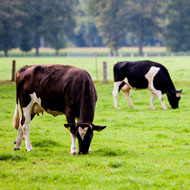
Surveillance identifies four infected cattle from France
Scientists have provided assurance that the UK remains free from bluetongue after four infected cattle were imported to the north of England and Scotland.
The cattle were brought to the UK from France in October 2017 without sufficient proof of vaccination. Bluetongue virus (BTV) was immediately confirmed.
Experts from the Pirbright Institute worked with the APHA, Defra and Scottish government to advise where and when secondary surveillance should take place.
To estimate the timing of onwards transmission, they looked at several factors that can influence BTV spread, such as seasonal changes in the population of Culicoides biting midges (which spread the virus) and temperatures at which the virus can replicate.
In order to demonstrate that there was no further transmission, Pirbright’s reference laboratory processed hundreds of samples from cattle, sent from the area that received them.
Dr Carrie Batten, head of the Non-Vesicular Disease Reference Laboratory at Pirbright, said: “Responding rapidly and with a high degree of certainty guaranteed by validated tests is a key component in reducing the impact of these events.
“These events highlight the challenges to the UK of living with viruses in neighbouring countries and emphasise that joined up approaches to sharing information are vital.”
BTV causes disease in livestock such as sheep, goats and cattle. Parts of Northern Europe, including France, have been affected by the virus since 2006. The UK remains free from BTV but surveillance is carried out on live animal consignments moving from neighbouring countries that are affected by BTV transmission.



 The Veterinary Medicines Directorate (VMD) is inviting applications from veterinary students to attend a one-week extramural studies (EMS) placement in July 2026.
The Veterinary Medicines Directorate (VMD) is inviting applications from veterinary students to attend a one-week extramural studies (EMS) placement in July 2026.